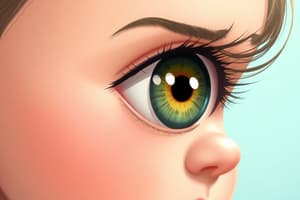Podcast
Questions and Answers
What is the purpose of conducting a cycloplegic refraction test in Emma's case?
What is the purpose of conducting a cycloplegic refraction test in Emma's case?
- To monitor the development of amblyopia
- To diagnose strabismus directly
- To assess for refractive error, particularly hyperopia (correct)
- To determine the need for surgery
What type of therapy will be used to encourage visual development in Emma's right eye?
What type of therapy will be used to encourage visual development in Emma's right eye?
- Occlusion therapy (patching) (correct)
- Surgical intervention
- Vision therapy exercises
- Color vision therapy
How often will Emma be monitored to assess improvement in her condition?
How often will Emma be monitored to assess improvement in her condition?
- Every 3-4 months (correct)
- Every 6-12 months
- Monthly
- Only during annual checkups
What action may be considered if Emma's strabismus does not improve with glasses and amblyopia treatment?
What action may be considered if Emma's strabismus does not improve with glasses and amblyopia treatment?
What was emphasized to Emma's mother regarding the patching therapy?
What was emphasized to Emma's mother regarding the patching therapy?
What is the primary diagnosis for Emma Watson's condition?
What is the primary diagnosis for Emma Watson's condition?
Which of the following symptoms did Emma NOT report?
Which of the following symptoms did Emma NOT report?
What does the Hirschberg Test help assess in eye examinations?
What does the Hirschberg Test help assess in eye examinations?
What is indicated by the cover test results for Emma?
What is indicated by the cover test results for Emma?
What visual acuity result was noted for Emma's right eye?
What visual acuity result was noted for Emma's right eye?
During the examination, what motion does Emma sometimes use to help her focus?
During the examination, what motion does Emma sometimes use to help her focus?
What was the general health status noted for Emma during the examination?
What was the general health status noted for Emma during the examination?
What type of amblyopia was identified in Emma's right eye?
What type of amblyopia was identified in Emma's right eye?
Flashcards are hidden until you start studying
Study Notes
Patient Information
- Emma Watson, a 6-year-old female, presented for an eye exam on March 15, 2024
- Her mother reported that Emma's right eye has been turning inward for the past year, especially when tired or focusing on distance objects.
- Emma's eye misalignment has become more noticeable in recent months.
History
- Emma's eye misalignment began 12 months ago, initially subtle and intermittent, but now increasing in frequency.
- Emma complains of occasional double vision and difficulty focusing at school, especially while reading.
- Emma sometimes tilts her head slightly to the right to improve her focus.
- Emma has no history of past eye surgeries or trauma.
Examination
- Visual acuity: Right eye: 20/40, Left eye: 20/20
- Ocular Examination:
- Hirschberg Test: Light reflex deviation in the right eye, indicating esotropia (inward deviation)
- Cover Test: Upon covering the left eye, the right eye moves outward to take up fixation, confirming right esotropia.
- Extraocular Movements (EOM): Full range of motion, no restrictions observed
- Pupils: Equal, round, reactive to light and accommodation
- Fundoscopy: Normal findings, no evidence of retinal abnormalities or optic nerve issues.
Diagnosis
- Right eye intermittent esotropia (squint)
- Amblyopia (reduced vision) in the affected eye
Differential Diagnosis
- Concomitant Esotropia: Likely, given age of onset and absence of neurological signs.
- Accommodative Esotropia: To be confirmed by refractive error evaluation
- Paretic Strabismus: Unlikely, as no limitation in extraocular movements or history of trauma.
Management Plan
- Refractive Error Correction: A cycloplegic refraction test will be conducted to assess for refractive error, specifically hyperopia (farsightedness). Prescription glasses may help control the esotropia if accommodation is a contributing factor.
- Amblyopia Treatment: Occlusion therapy (patching) of the left eye (dominant eye) for several hours a day to encourage visual development in the right eye.
- Follow-up: Every 3-4 months to assess improvement in alignment and vision. Adjustments to glasses or therapy may be needed based on progress.
- Surgical Consultation: Referral for possible strabismus surgery (to align the eyes) will be considered if the strabismus doesn't improve with glasses and amblyopia treatment.
Patient Education
- Mother was educated on the importance of adhering to patching therapy to treat amblyopia and prevent long-term vision loss.
- Discussed the possibility of needing glasses or surgery, depending on the severity and persistence of the squint.
- Advised to return to the clinic immediately if Emma develops any new symptoms, such as worsening vision, pain, or significant changes in eye alignment.
Conclusion
- Emma is a 6-year-old girl diagnosed with intermittent esotropia and amblyopia of the right eye.
- Initial management will focus on correcting any refractive error and treating the amblyopia.
- Follow-up is essential to monitor progress and consider additional interventions if necessary.
Next Appointment
- June 25, 2024
Studying That Suits You
Use AI to generate personalized quizzes and flashcards to suit your learning preferences.




